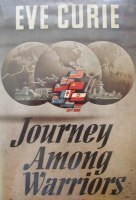Eve Curie was the 'dummy' of her family. I say this because both her mother and father, her sister and brother-in-law, and her husband all received a Nobel Prize, but Eve did not.
Instead, she became a journalist. However, before doing so, she had written a biography of her famous mother. This book was read by many of the famous or important, major and minor personages she would later meet. This may have helped her gain access to many of the important decision makers of World War II and help her overcome obstacles or rules that hampered other journalists.
Curie journeyed from New York to Burma by plane, ship and car. This also included an extensive side trip to Russia. Unlike many journalists, she was able to come very close to the front lines when the war was still in its undecided stages. All this, despite the fact she was a women. A number of the people expecting a journalist, on orders from above, were surprised to discover her sex when she arrived.
After her long journey, she wrote a book about her travels and the people, famous and unknown, she had met. The book was as popular as it was compelling. I did find the first few chapters somewhat uninteresting, but this all changed upon her arrival in Africa on her way to the various war zones, and the rest of the book seem to fly by quickly. If you don't wish to read the entire book, please read just the final chapter. It expresses her opinion on how the war would be fought and how the people of the various nations were responding. It is very inspiring.
Instead, she became a journalist. However, before doing so, she had written a biography of her famous mother. This book was read by many of the famous or important, major and minor personages she would later meet. This may have helped her gain access to many of the important decision makers of World War II and help her overcome obstacles or rules that hampered other journalists.
Curie journeyed from New York to Burma by plane, ship and car. This also included an extensive side trip to Russia. Unlike many journalists, she was able to come very close to the front lines when the war was still in its undecided stages. All this, despite the fact she was a women. A number of the people expecting a journalist, on orders from above, were surprised to discover her sex when she arrived.
After her long journey, she wrote a book about her travels and the people, famous and unknown, she had met. The book was as popular as it was compelling. I did find the first few chapters somewhat uninteresting, but this all changed upon her arrival in Africa on her way to the various war zones, and the rest of the book seem to fly by quickly. If you don't wish to read the entire book, please read just the final chapter. It expresses her opinion on how the war would be fought and how the people of the various nations were responding. It is very inspiring.




